Khloe Kardashian Cut This Food and Lost 11 Pounds
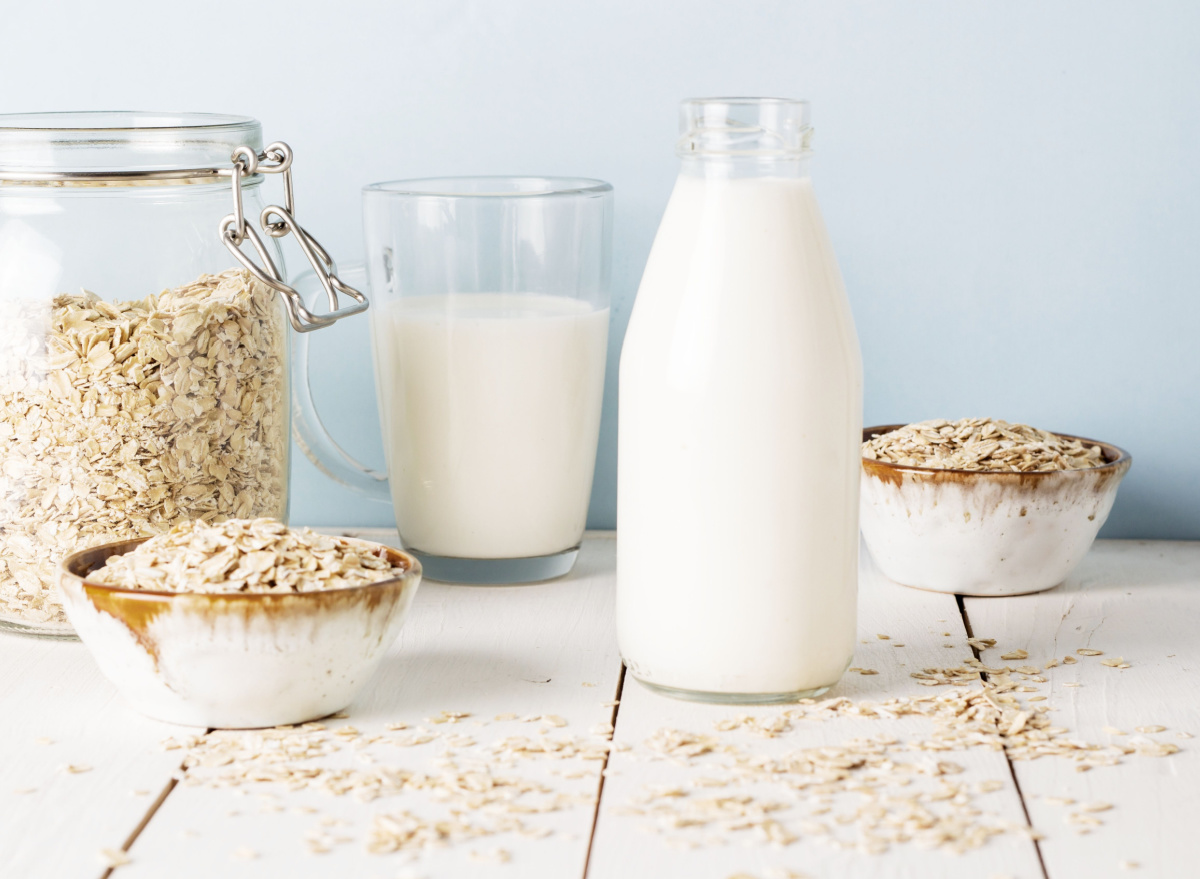
Just this week, Khloé Kardashian—the weight-loss and fitness icon, with a healthy hourglass figure—revealed her secret weight-loss trick. It didn’t involve hours on the treadmill or a painful juice cleanse, or four weeks spent at some celebrity weight-loss camp. Insead, Khloé did just one thing: She gave up dairy. “In a month and a half, I lost 11 pounds just from not eating dairy, without doing anything else different,” she said.
I wasn’t surprised. Test panelists on my Zero Belly Diet saw even more dramatic results when they gave up dairy for six weeks, just one of a handful of small tweaks that resulted in enormous changes: some people lost as much as 16 pounds in 14 days, and up to 7 inches off their waist in just six weeks. (The plan was so effective, readers clamored for more dairy-free recipes, which is why I’ve just released Zero Belly Smoothies!)
Now, I’m still a big believer that milk can be great for some diets—it’s high in protein, good for blood pressure, and an excellent source of Vitamin D and bone-friendly calcium. But I’ve also seen that cutting down on milk can result in an almost immediate reduction in your waist size for some people, as your gut becomes less bloated and your belly flattens out rapidly. “I saw results almost immediately,” said Martha Chesler, one of our original test panelists, sounding like a Kardashian—she lost 7 inches off her waist in six weeks. A flat belly isn’t the only benefit. Check out some of the amazing things that happen to your body when you give up the cow juice, compliments of Zero Belly Smoothies.
You’ll Lose Weight Fast, Like Khloé
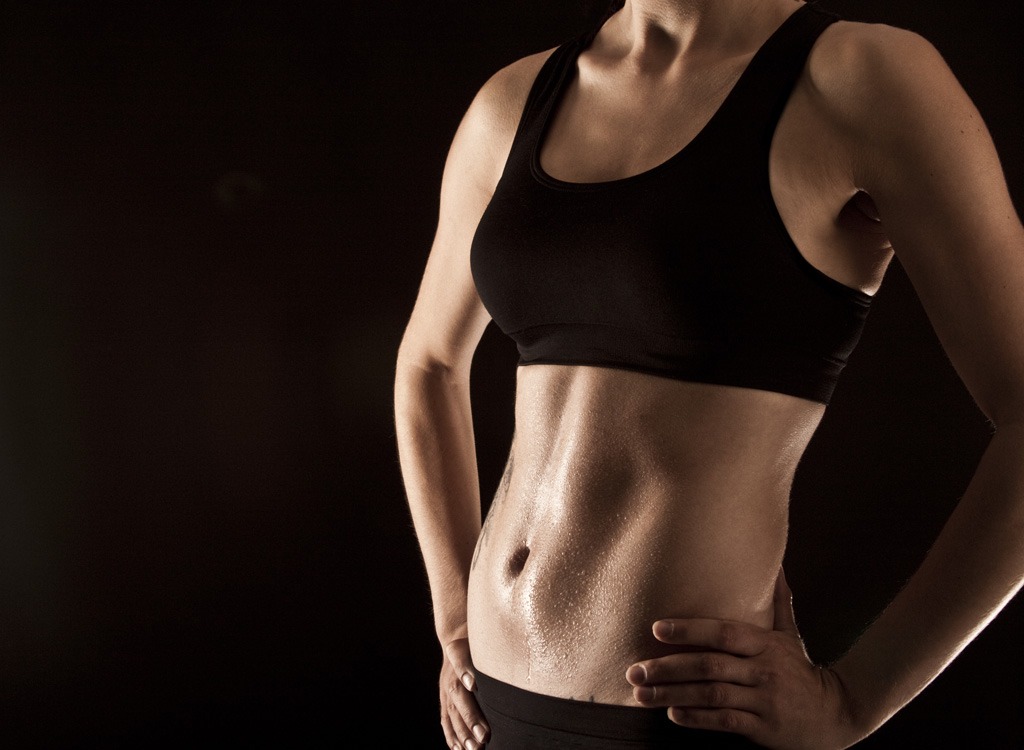
With all those “Got Milk?” ads, it’s no wonder we tend to associate dairy consumption with being slimmer and healthier. But all the moo-related marketing might not be all that it’s milked to be: One meta-analysis published in The Journal of Clinical Nutrition, which reviewed nearly 30 studies, found that results don’t “…support the beneficial effect of increasing dairy consumption on body weight and fat loss.” Simply put: There’s no solid scientific evidence that eating dairy will boost weight loss or even help you maintain your weight. In fact, one study of more than 12,000 kids found that the more milk they consumed, the more weight they gained. And given that recent research in Zero Belly Smoothies has concluded that veganism is the absolute top lifestyle for weight loss, going dairy-free might be one easy way to start your bathroom scale trending downward. For more of the fastest ways to lose weight rapidly, click here for these essential 14 Ways to Lose Your Belly in 14 Days!
Your Digestion Could Improve

About 65 percent of the population suffers from lactose intolerance, a gastrointestinal condition in which the body is unable to easily digest lactose, a type of naturally occurring sugar in dairy. The reason: Most people actually stop producing lactase—the enzyme required to digest dairy—in adulthood. That may be part of our body’s natural defense system: People who are lactose intolerant have a lower risk of lung, breast and ovarian cancers, perhaps because they eat far less dairy, according to a 2014 study in the British Journal of Cancer. Yet countless Americans drink their milk and endure the resulting discomfort anyway. (The problem can be even more pronounced for people who suffer from irritable bowel syndrome, or IBS.)
Your Skin Will Clear Up

There’s a reason Khloé is always glowing. Instead of buying expensive products, the simple act of giving up dairy may quell skin flare-ups. Many dermatologists also recommend going dairy-free as a first course of action against skin conditions such as acne and eczema. Many of our test panelists reported an improved complexion as one of incredible side benefits of the Zero Belly plan. “It’s easy to stick with and makes sense,” said Jennie Joshi, who lost 11 pounds and 2 inches off her waist. “And the added benefits: flawless skin, less bloating and more energy!” Speaking of rewiring your body, don’t miss these essentiial 9 Foods That Shut Off Your Hunger Hormones—Fast!
For 100+ Creamy, Delicious Weight-loss Recipes, Click Here for Zero Belly Smoothies!
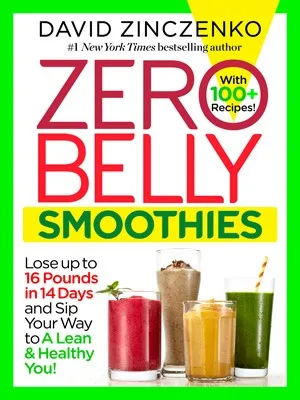
You’ll Strengthen Your Bones
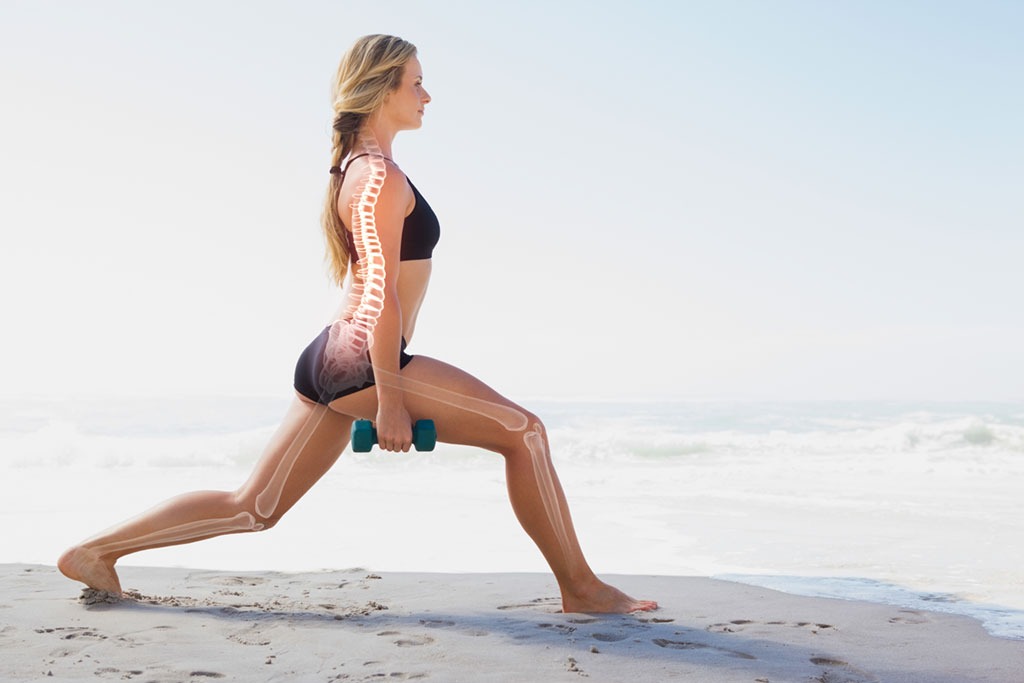
What? Wait a minute: Isn’t drinking milk the best way to get bone-strengthening calcium? Not according to a 2014 study in the British Medical Journal. Researchers found that the more milk people drank, the more likely they were to suffer hip fractures. (Yogurt did have some protective powers, however; that may be because much of the lactose in yogurt is destroyed by the bacteria that ferments it, or because of the protective properties of the bacteria itself.)
You’ll Still Get Plenty of Calcium

We tend to make a nearly instant association between dairy and calcium, but there are countless plant-based sources of this vital bone-building mineral. Leafy greens, beans, nuts, fruits (especially oranges and figs), and fortified cereals and nut milks deliver plenty of the mineral. (A bowl of Total, for instance, gives you an entire day’s worth of calcium—before you add any milk.) All the Zero Belly Smoothies are made with plant-based proteins and nut or alternative milks. For more ideas, don’t miss the list at the end of this story.
You’ll Slash Your Risk for Diabetes

Thanks to our society’s focus on cutting fat, most of the dairy products you’ll encounter nowadays are reduced-fat, skim, fat-free, 1%, or some other processed variation on what originally came out of the cow. Here’s the definitive word: Low-fat dairy is bad for you. In fact, the more low-fat dairy products you eat, the higher your risk of diabetes, according to a 2015 study of nearly 27,000 people in the American Journal of Clinical Nutrition. The reason may be that manufacturers replace the missing fat with sugar, turning their dairy products into diabetes-delivery systems. If you’re trying to cut down on fat and calories, low-fat dairy is not the way to do it.
Lose Weight in Less Than 30 Seconds, with the 100+ Proven Recipes in Zero Belly Smoothies!

You’ll Benefit from Even This Minor Switch
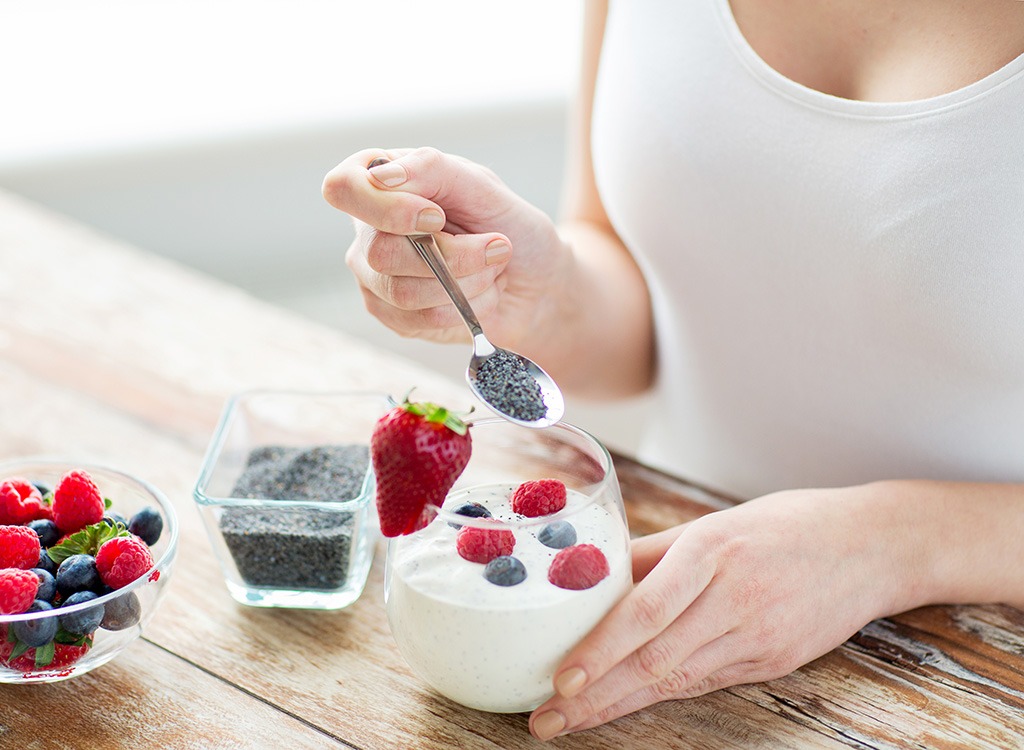
Can’t take the plunge and pull the full-Khloé? Consider using plain, full-fat yogurt in place of milk when possible—as a base for cereals or smoothies, for example. Those who eat yogurt frequently have better bone density than those who eat other types of dairy, according to a study in the journal Arch Osteoporosis. And the probiotics in yogurt, which you won’t find in milk, can help you double your weight loss when you’re on a diet, according to a study in the British Journal of Nutrition. Before shopping, read this essential list of the 10 Best-Ever Yogurts for Weight Loss!
And Don’t Miss These Top 10 Sources of Dairy-Free Calcium
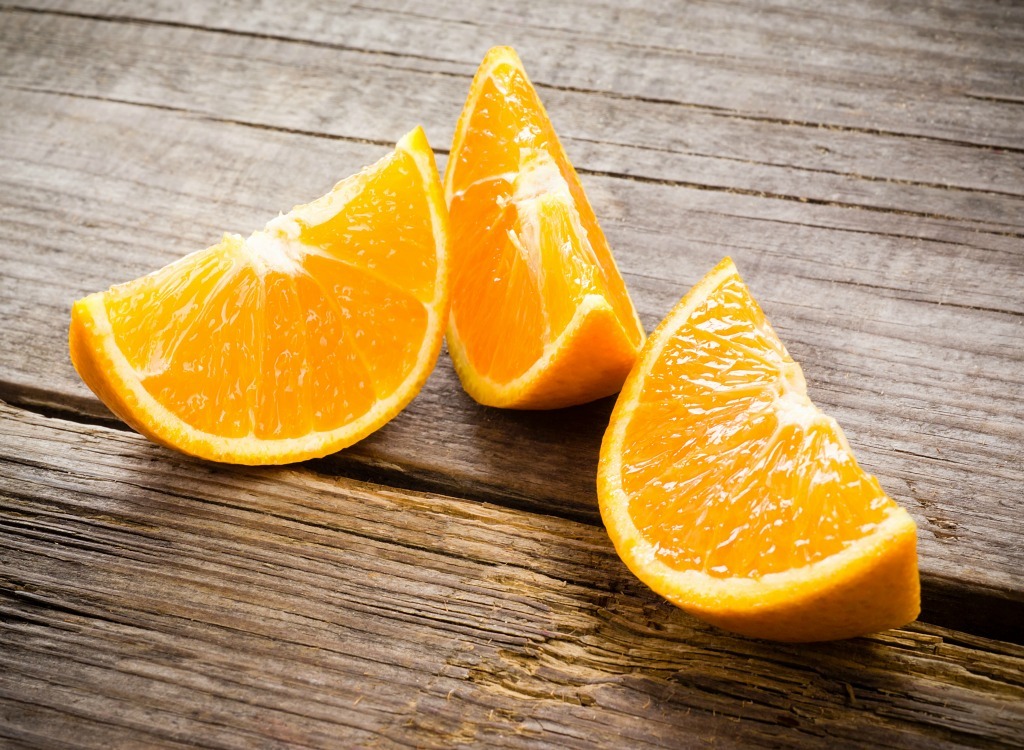
It’s not exactly a newsflash that calcium plays a leading role in bone health and the prevention of both osteoporosis and cancer, but what you may not know is that there are a number of ways to get this nutrient without downing any dairy or choking on a supplement, according to research in Zero Belly Diet. In fact, several studies have linked calcium supplements to an increased risk of heart attack and death from cardiovascular disease, so it’s better to err on the side of caution and consume the mineral naturally through food. Below you’ll find 10 of the best non-dairy sources of the mineral, ranked in order from the least nutrient-dense to the most potent. Head to the grocery store and stock up on these items to keep your bones and bod healthy and strong.
Sunflower Seeds

Calcium content: 1 oz, 20 mg, 2% DV
Top salads with these seeds for some added crunch, or munch on a one-ounce serving as a snack. In addition to their calcium content, these tiny seeds are also a good source of antioxidant-rich vitamin E and copper—a nutrient that supports white blood cell health.
Creamy. Chocolately. Fruity. Green. Weight-loss Has Never Been More Delicious Than with Zero Belly Smoothies!

Figs

Calcium content: 3 medium, 52 mg, 5% DV
While figs may be best known for their inclusion in the famous Fig Newton cookies, you’ll have to eat the whole fruit to reap its bone-building benefits. Chop up fresh or dried figs and add them to oatmeal, salads or Greek yogurt with some honey, cinnamon and slivered almonds. Alternatively, you can eat them whole as a quick, on-the-go snack. Three of them will cost you 110 calories.
Broccoli or Broccoli Rabe
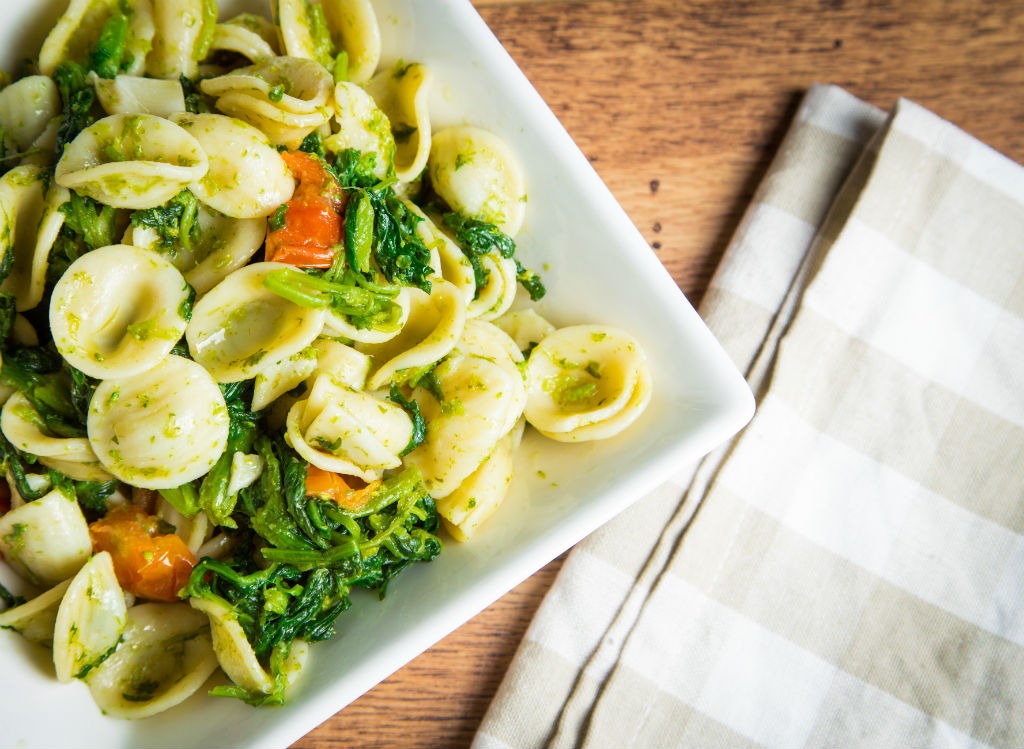
Calcium content: 1 cup cooked, 62 mg, 6% DV
It seems mom was onto something when she told you how important it was to eat your broccoli. This cruciferous vegetable is rich in calcium and a host of other good-for-you nutrients—as is its slightly bitter-tasting cousin, broccoli rabe. A cup of the steamed variety has a whopping 301 milligrams of bone-protecting calcium and is a good source of immune-boosting vitamin C, too. Add both veggies to your diet to stay strong and healthy.
Sweet Potatoes

Calcium content: 1 large, 68 mg, 7% DV
This humble root vegetable is a good source of calcium, potassium, and vitamins A and C. That’s a serious line up for such a simple spud. Instead of baking one in the oven, why not tap into your culinary creativity and use the spuds to make some homemade fries? (Who doesn’t love fries?!) After slicing the potato lengthwise into strips, top with coconut oil, salt, pepper and garlic powder, and pop them into the oven on 350 degrees F until they’re crispy.
Lose Up to 14 Pounds in 16 Days, Compliments of Zero Belly Smoothies!

Oranges

Calcium content: 1 large, 74 mg, 7% DV
While this citrus fruit is best known for its rich vitamin C content, one large orange also provides 74 milligrams of calcium. Enjoy the fruit solo as a snack, or pair some slices with spinach, slivered almonds, grilled chicken, shallots and a ginger dressing to create an Asian-style salad.
Kelp

Calcium content: 1 cup, 134 mg, 13% DV
Kelp, a variety of sea vegetable, is commonly found in Asian dishes. A cup of the greens serves up 134 milligrams of calcium, in addition to a hefty dose of fiber and iodine—a mineral that helps maintain thyroid health. If you like making homemade smoothies and juice, substitute kelp for kale to reap the benefits. Big fan of miso soup? Throw some kelp into the broth to up its nutritional value.
White Beans
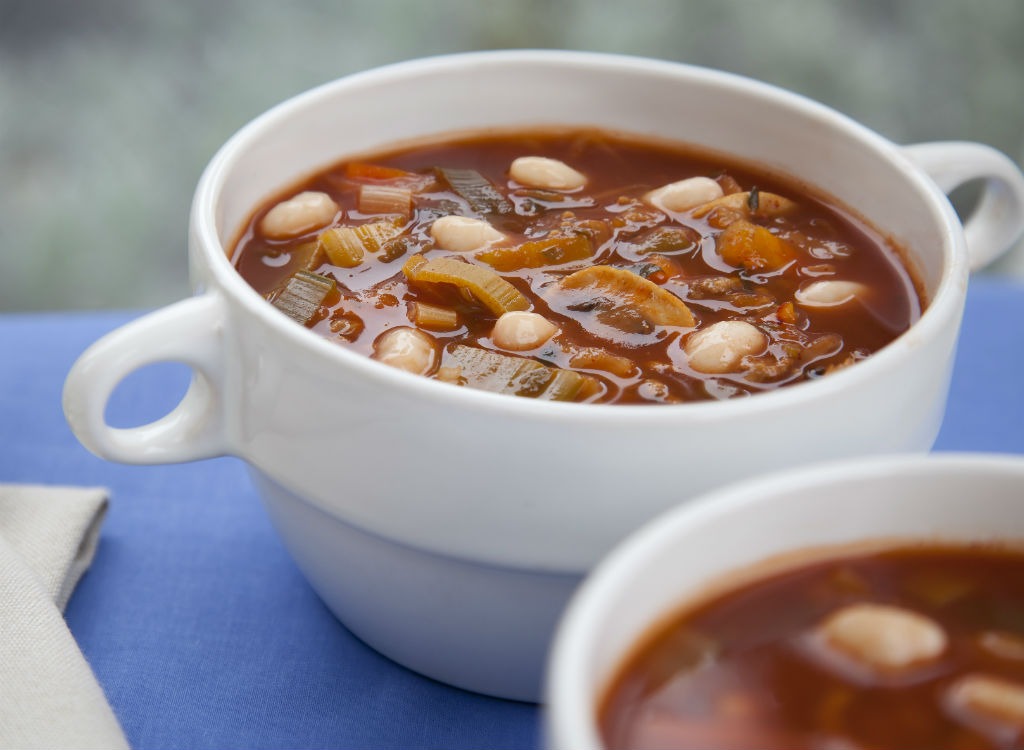
Calcium content: 1 cup, 161 mg, 16% DV
White beans serve up not only a healthy dose of belly-filling fiber, muscle-building protein and bloat-busting potassium, but also a significant dose of calcium. Need another reason to add some to your plate? The musical fruit is rich in something called resistant starch, a nutrient that increases metabolism and helps promote fat oxidation and prevents long-term fat accumulation.
Sautéed Greens

Calcium content: 1 cup, cooked 94 mg-197 mg, 9.4 – 19.7% DV
You likely already know that adding more greens to your plate is a low-cal, healthy move, but did you know that kale, turnip and mustard greens can also help keep your bones strong? It’s true! To get the most of the mineral from these vegetables, you’ll want to consume them cooked—not raw. So take out your steamer or sauté up a batch with some seasoning for a quick, strengthening side dish.
For 100+ Creamy, Delicious Weight-loss Recipes, Click Here for Zero Belly Smoothies!

Edamame and Tofu
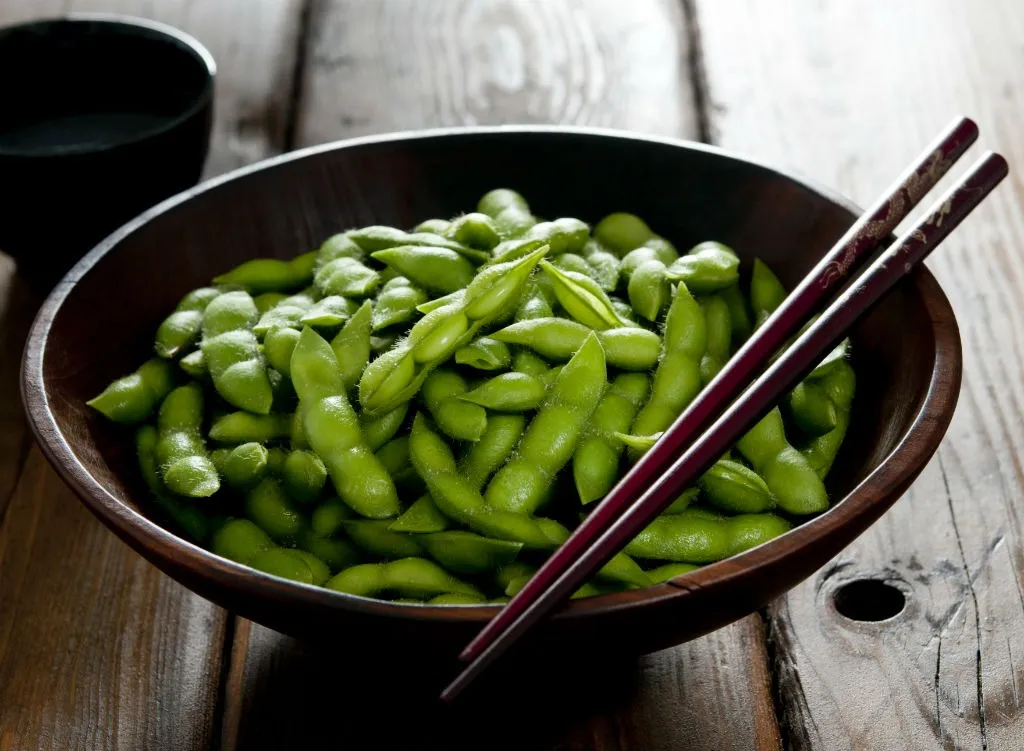
Calcium content: 1 cup, 98-334 mg, 10-33% DV
Anyone who has ever gone out for sushi has likely munched on the boiled soybean appetizer edamame. This dish is a good source of calcium, fiber and muscle-building protein. Big fan of edamame’s cousin, tofu? Although calcium content varies by brand, some varieties serve up to 33 percent of the day’s calcium in a single one-cup serving. Be sure to compare nutrition labels to ensure your go-to brand is a good pick for your bones.
Sardines

Calcium content: 3 ounces, canned in oil with bones, 325 mg, 33% DV
Sardines are one of the best sources of dairy-free calcium out there–if you can stomach them. Look for varieties canned with the bones, which are soft and completely edible. Sorry, that’s a non-negotiable. The bones are where all the calcium comes from! So while it may seem hard to swallow, this is the variety you’ve got to consume if you want to reap the benefits. Toss the fish into a bed of leafy greens with tomato, cucumber, olives, feta and red wine vinegar. The combo makes for a tasty, Mediterranean-inspired dish. For a quick snack, top whole-grain crackers with two or three sardines and a squeeze of fresh lemon for added flavor.

Flatten Your Belly—in Just 30 Seconds! Buy Zero Belly Smoothies today!